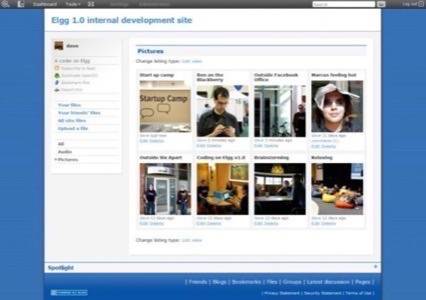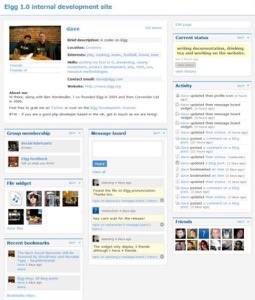When we first introduced you to Elgg two years ago, it was a new social networking platform whose focus was on e-learning. Since that time, the software has been rewritten and it has moved away from being strictly for educational use only. Today, the award-winning Elgg is one of the top open source social networking platforms available on the internet.

A little over a month ago, Elgg 1.0 was introduced to the world. In this newest release, several years in the making, the software has been improved from the inside out. It has a more attractive UI and design, for starters. But under the hood you’ll find more changes like better plugin support, RSS and OpenDD views, and a new database schema.
We may have said that the next social networks would be powered by blogging CMS platforms like WordPress and Movable Type, but what we’re really seeing is a shift towards making all web platforms more open and social experiences.
To that end, Elgg can help form the basis of a new generation of social networks. But their platform goes beyond just delivering a solution for the next web 2.0 hangout or social site, although that it a popular use for their software. The Enterprise 2.0 movement is also aided by Elgg as companies wanting to build and customize their own intranet-based social networks have begun to adopt the platform as well.

The Interview
We recently had the opportunity to follow up on our original interview with one of Elgg’s founders, David Tosh. We talked about where Elgg stands today and what plans they have for the future.
How would you describe Elgg to someone who didn’t know what it is?
Elgg is an open source social networking engine started by Ben Werdmuller and myself back in 2004. Elgg can be used by developers as a starting point from which to build out their own social applications (it handles common back-end functionality and has an extensive programming API), and out of the box as a useful social utility. This year, it was voted by a panel on InfoWorld as the best open source social networking platform 2008.
What’s new with Elgg since we first spoke?
We have completely rewritten the Elgg core. This was necessary in order to future-proof the project, improve scalability and allow for greater customization. Over the past four years, we have found that one size really does not fit all, so we had to make sure Elgg was flexible enough to handle new demands being thrown at it, both now and in the future. The era of the monolithic social network is coming to a close; we want to make it easy for people to add social functionality into all kinds of applications.
Why did you move away from being a platform focused on education?
Although we’ve always had an educational base, a lot of users from other fields began picking up on Elgg. As a result, we were securing contracts to build custom networks on Elgg for groups that were not part of the educational circle, and feeding those developments back into the product. Gradually, interest in Elgg became greater outside of education, so we adapted to that change.
How does Elgg compare to its commercial competition?
With its new architecture and open standards at its core, we feel it is best placed to handle changing expectations in the social arena. It’s a very competitive space, but a lot of products have just bolted social features on top of their existing systems – Elgg has social functionality built into the core and was designed from the ground up to support it. That allows us to create deeper features, and also plan ahead for new kinds of social applications. As the types of social applications and uses for them grow, we feel our approach will pay dividends.
Some employers are letting employees use Facebook at work now. Do you worry that will affect the number of potential customers for your product?
Not really. If anything, I think this increases the potential and opportunity. Facebook, Twitter, LinkedIn etc play an important role in bringing the concept of social technology to new audiences. For groups like us, who provide niche services, this is great. For example, companies try out Facebook and then start releasing that they want to improve their internal communications to be more Facebook-like; we can help them with that.
Why should someone consider Elgg for their network?
I think there are three main reasons: simplicity, extensibility and openness. The basic version of Elgg is deliberately very simple and clean. Our architecture allows you to easily extend Elgg’s functionality to meet your specific requirements. Lastly, we fully embrace open standards such as OpenDD, FOAF, RSS, Open Social and OpenID, allowing you to interact with other applications.
Who is using Elgg today?
Elgg users range from sports networks to corporate companies, university intranets to school districts. There is a wide cross section picking up the software and applying it to their own niche. Increasingly, companies are also using Elgg to build social sites for their clients; we’re keen to promote and support this.
What’s in store for Elgg’s future?
We have a couple of things in the pipeline:
- Firstly, we’re going to launch an Elgg supporter scheme. This will give companies who are providing Elgg-related services the chance to form closer links with the core project.
- We are working on a new mobile intranet platform, powered by Elgg, that allows users to share status updates, photos, documents and media via MMS, SMS, email or the web. It also handles simple notes and shared tasks.
- We decided we needed a system within Curverider to improve our communication while on the move, and built it for our own use; it’s been so successful that we thought other companies and organizations might find it useful as well. So far, the reaction from people we’ve shown it to has been extremely positive.
- All Elgg-powered services have the Open Data Definition built into their core, which allows for full import and export of users, content and connections as well as the ability to syndicate friends’ activity in a distributed way.
- Lastly, we have just announced an advisory board that is packed with experts with excellent track records, in order to ensure Elgg and Elgg-powered services continue to develop and grow.











